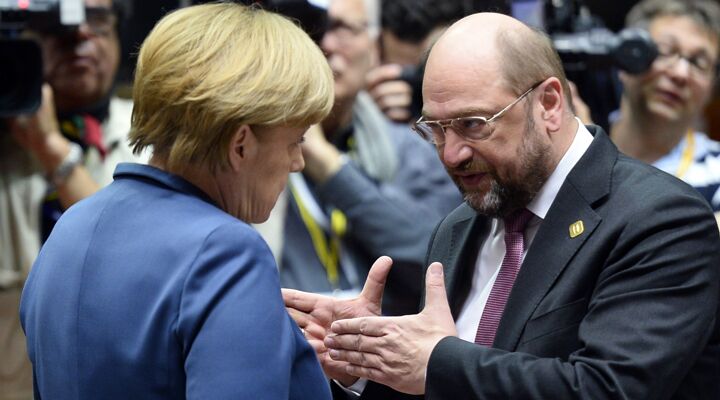
Germany Attempts to Break Euro Crisis Deadlock
Europe’s efforts to fix its economy have ground to a halt, undone by an impossible negotiation. Germany—the eurozone’s main source of cash—and the struggling nations of southern Europe are refusing to compromise.
Each side’s position seems perfectly reasonable. On the one hand, Germany is refusing to commit to paying off the credit cards of the southern European nations without having a say in how those credit cards are used. Germany feels perfectly justified in making this demand. Yet Southern Europe does not want Germany to overrule the spending decisions of their democratically elected parliaments. Giving Germany say over how taxpayers’ money is spent would be tantamount to surrendering the nation to Germany.
This is the contradiction that comes with nations sharing a currency without sharing a government. The past five years show us how this situation will end. Greece, Portugal, Cyprus and others surrendered a limited amount of sovereignty in exchange for a limited amount of cash.
But each of these cases were a one-off—a product of negotiations conducted in panic. What Europe is trying to sort out now is a solution for the whole eurozone that can be used to solve any similar crisis.
So far there’s been little progress. Without the immediate threat of bankruptcy, nations have been unwilling to give up sovereignty to Germany.
Part of Germany’s solution was to create a new committee to decide which European banks received a bailout from a combined eurozone pot. Berlin’s preferred make-up of the committee would mean that Germany combined with just one other eurozone country would be able to block any bailout. They would decide which banks lived and died, bringing down the host nation’s economy with them.
Other eurozone economies refused to allow this, so Germany refused to put forward the money necessary to make the bailout system work. The result is a mess that fixes nothing. We’re right back to where we started.
In this context, Germany’s Bundesbank detonated its latest bombshell. It argued that before nations get an international bailout, they should first introduce a “one-off capital levy.”
What this means is that the government introduces a one-off tax on your wealth and assets. For example, if you have $100,000 sitting in the bank or saved in a retirement fund, or if you own a house worth $100,000, the government takes a percent of that away overnight. The International Monetary Fund (imf) made a similar suggestion in October, saying that a tax rate of 10 percent would be needed.
The idea is crazy, although from the German point of view, very reasonable. A recent study concluded that average wealth is higher in the countries being bailed out than it is in Germany—mainly because of the low rate of home ownership in Germany. German taxpayers are asking why they’re being forced to bail out people who are richer than they are.
But this type of tax would probably end up costing Germany more than a standard bailout. If Spain were forced to do this, for example, then foreigners would quickly pull their money out of countries at risk, perhaps bringing down their economies too. The resulting economic crash would hurt German exports.
It would also be electoral suicide for the government of the country that is forced to implement the tax. Even if all the major parties agreed on the tax, that would probably not be enough to save them. In Greece, the established parties were cut down almost overnight. It would be as if America’s Republicans and Democrats lost such a huge share of the vote that the two were only able to govern in coalition. How much more support would political parties lose if they launched an overnight raid on the cash of their citizens?
The message from the Bundesbank is this: If you don’t want to submit to Germany’s conditions, that’s fine. There are other ways you can bail out your governments and banks, but they’re pretty painful. It would be much better for you to do it the German way.
The euro crisis is out of the news, but the fundamental problem at the heart of the euro has not been solved. Crises will keep coming up until that is fixed. But it will be fixed—and the Vatican will have a role in that, as we pointed out in the latest print edition of the Trumpet magazine. Watch for these conflicts to soon be resolved in Germany’s favor.
For more background on this subject, read Trumpet editor in chief Gerald Flurry’s important article “Did the Holy Roman Empire Plan the Greek Crisis?”
